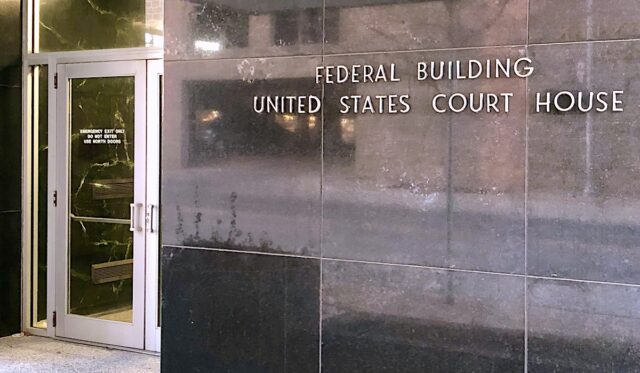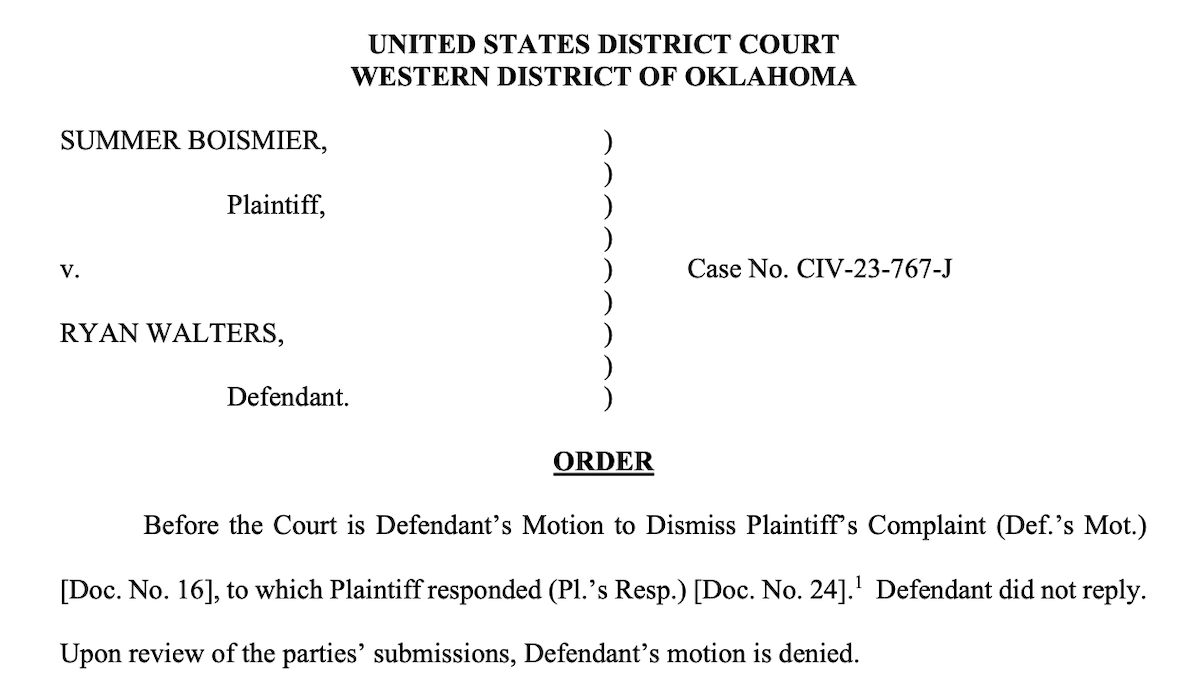

With so many different lawsuits to keep up with across the state, it can be difficult to stay apprised of every motion an attorney files and each ruling a judge hands down. The following roundup makes a quick effort to chronicle updates on cases NonDoc has been following.
In a lawsuit surrounding the firing of an Oklahoma Christian University professor after a gay guest speaker delivered a presentation to his class, attorneys representing the university asked a judge in January to dismiss the case owing to the church autonomy doctrine.
Meanwhile, a federal judge denied State Superintendent of Public Instruction Ryan Walters’ motion to dismiss a defamation case filed against him by a former teacher last summer.
Additionally, a judge has preliminarily accepted a settlement agreement from the plaintiffs in a Title IX case alleging that the University of Central Oklahoma failed to provide equal treatment and benefits for its male and female student-athletes. Another Title IX lawsuit alleging that UCO failed to protect six students from sexual harassment by an interim dean has been jointly dismissed by the plaintiffs.
Below, readers can learn more information about those cases and a new exemption to a criminal doctrine affirmed by the Oklahoma Court of Criminal Appeals.
Oklahoma Christian invokes church autonomy doctrine in O’Keefe, Hale case

Attorneys for Oklahoma Christian University claimed in a January filing that the court should not be involved in a breach of contract lawsuit filed by a former professor, as the university is a religious institution.
In March 2022, Oklahoma Christian fired former professor Michael O’Keefe after the university deemed a guest speaker’s presentation in his class inappropriate. In December 2022, O’Keefe and Scott Hale — the guest speaker who also taught at OC for nearly 20 years — filed a breach of contract lawsuit regarding O’Keefe’s termination. Their suit includes claims of libel, false light and intentional infliction of emotional distress.
O’Keefe, formerly a tenured graphic design professor who taught at Oklahoma Christian University for 41 years, was fired by the university for gross misconduct after Hale — a gay man who formerly worked as an adjunct professor at OC for nearly 20 years — delivered a presentation in O’Keefe’s class that the university deemed “inappropriate and graphic.”
Hale’s presentation was delivered in O’Keefe’s Business of Branding Yourself course, where he discussed his resilience through trauma. O’Keefe said during an April 2022 interview that Hale discussed a traumatic experience that occurred when at the age of 10 he was forced to expose himself to a group of 10-year-old boys during a game of truth or dare at a slumber party.
On March 16 — nine days after O’Keefe was fired — Stephen Eck, chief legal counsel at OC and a defendant in the lawsuit, emailed university faculty and staff about O’Keefe’s firing.
“The employment termination process was prompted by multiple complaints from eyewitnesses or others aware of the inappropriate and graphic language of a sexual nature, and stories shared in O’Keefe’s class a couple of weeks ago, by a guest speaker O’Keefe invited and arranged to speak,” Eck wrote. “Some of the speaker’s remarks included telling the class about his history of exposing his genitals to others and leading others to participate in a game he called ‘truth or dick.’ The unchallenged language used and content shared with students is unacceptable in any class at OC no matter who says it or the speaker’s orientation.”
O’Keefe and Hale, joint plaintiffs in the lawsuit, filed their petition against Oklahoma Christian in December 2022. While the breach of contract claim deals with an alleged violation of O’Keefe’s employment agreement by Oklahoma Christian, the claims of libel, false light and intentional infliction of emotional distress are related to Eck’s email to faculty.
In January 2023, the university moved to compel arbitration, arguing that O’Keefe had entered into an enforceable arbitration agreement under his contract. In May, Oklahoma County District Court Judge Richard Ogden sustained OC’s motion, but only for the breach of contract claim, not the three tort claims. In June, attorneys for Oklahoma Christian filed an interlocutory appeal on Ogden’s ruling, arguing that all of O’Keefe’s claims should be subject to arbitration.
While the case has been handled by the appellate courts since the June interlocutory appeal, OC’s attorneys moved Jan. 31 for a partial lift of the district court stay in order to file a motion seeking dismissal of all claims from O’Keefe and Hale based on the church autonomy doctrine.
The church autonomy doctrine, according to OC’s January 2024 filing, “bars courts from exercising subject matter jurisdiction over disputes involving faith, church, discipline and church government.” OC’s claim is based on recent opinions from the Oklahoma Supreme Court in two separate cases of the same name: Oklahoma Annual Conference of the United Methodist Church v. Timmons.
Under a narrow reading, the UMC v. Timmons cases held that the church autonomy doctrine barred Oklahoma courts from hearing property dispute cases involving churches in Oklahoma disaffiliating with the United Methodist Church because disaffiliation was governed by rules in ecclesiastic documents, and it would violate the First Amendment for courts to interpret religious texts.
OC’s filing does not cite any ecclesiastic documents the court would have to interpret in the O’Keefe and Hale’s case, instead advocating a broader reading of UMC v. Timmons that bars hearing any dispute that involves church government.
In a response brief filed by O’Keefe and Hale’s attorneys in February, they asked the appellate court to deny the university’s motion to lift the stay in the district court proceedings, arguing that the church autonomy doctrine “has been an available defense” long before the rulings in UMC v. Timmons.
Kevin Jacobs, a former OC president and an attorney representing O’Keefe and Hale, declined to comment on the case. OC was unable to provide a statement prior to the publication of this article.
Judge denies Ryan Walters’ motion to dismiss defamation case

On April 15, federal Judge Bernard Jones denied State Superintendent of Public Instruction Ryan Walters’ motion to dismiss a defamation case filed against him last summer.
Former Norman High School teacher Summer Boismier filed the case against Walters on Aug. 30 in U.S. District Court for the Western District of Oklahoma alleging that the numerous statements he made a year previously regarding one of her classroom displays were defamatory.
Boismier resigned from her position just days into the 2022-2023 school year after a parent complained about Boismier covering her classroom library with red butcher paper and writing on it, “Books the state doesn’t want you to read.” Boismier also posted a QR code in her classroom that linked to the Brooklyn Public Library’s Books Unbanned project.
The incident sparked the ire of Walters, who was campaigning for the superintendent position at the time. In calling for the revocation of her teaching certificate, Walters said Boismier was providing her students with access to “banned and pornographic material.”
“Using this public and widely followed Twitter account, Walters published the false criminal allegations so that they would ultimately be seen by thousands of people,” Boismier’s lawyer wrote in the complaint. “Immediately following Walters’ statements, Boismier received numerous threatening messages and harassment that referenced the allegations made by Walters either explicitly or in substance. (…)
“The false statements made by Walters about plaintiff are consistent with a longer pattern of repeatedly using false sensational allegations against educators for political or personal gain or distraction from his own scandals or alleged misconduct as a state political figure.”
A series of filings ensued wherein Boismier’s lawyer first had to explain to Jones that a delay in proceedings was due to his own health issues and Walters being “notoriously difficult to serve” with litigation.
Next, once Walters was finally served with the lawsuit, his out-of-state lawyers asked for multiple delays while they tried to find local counsel that did not constitute a “conflict of interest.”
Finally, Walters and his team of new lawyers asked Jones to dismiss the case Jan. 16. Among other things, Walters’ lawyers argued that Boismier was a public figure at the time of the events, meaning her defamation claim had to prove actual malice on behalf of Walters. The same argument — that a public school teacher stands as a public figure who is more difficult to defame — is being made by The Oklahoman in an appeal of the $25 million libel judgment against the newspaper’s parent company earlier this year.
“Plaintiff cannot point to any actionable false statement made by Walters, nor does she meet the standard for alleging a defamation claim as a public figure because she does not allege any actual malice on the part of Walters,” the lawyers wrote. “Therefore, plaintiff has failed to state any viable claim against Walters.”
After Boismier replied to the motion Feb. 13, the case sat pending for two months before Jones released an order dismissing Walters’ motion outright, saying that there was not enough evidence at this stage of the proceedings to conclude that Boismier qualified as a public figure.
“But even assuming that plaintiff is a public figure, she has alleged, albeit without use of the word ‘malice,’ that defendant made the statements deliberately in spite of their falsehood,” Jones said in his order. “Thus, to the extent that a showing of actual malice is required in this case, the court finds that actual malice is sufficiently alleged at defendant.”
Jones’ dismissal means Walters will now have to reply to Boismier’s initial complaint by denying or accepting the allegations it contains.
As the case continues to move forward in federal court, Walters is currently set to ask the State Board of Education to revoke Boismier’s teacher certificate in May. That hearing has been rescheduled a number of times since other media reported that a hearing officer said in June that OSDE failed to justify attempts to revoke her certificate.
In other Walters-related court case news, two hearings are scheduled for May in the St. Isidore of Seville Catholic Virtual School case in Oklahoma County District Court. Walters is a defendant in the case, which asks the court to enjoin the school from opening on First Amendment separation of church and state grounds.
Settlement agreement proposed in class-action lawsuit alleging Title IX violations by UCO

A settlement agreement has been preliminarily accepted by a U.S. district judge in a class-action lawsuit alleging UCO violated Title IX by failing to provide equal benefits and treatment for male and female student-athletes.
Filed in September 2022 by three members of the UCO women’s track and field team, the lawsuit also alleges that the university retaliated against the plaintiffs for speaking out by firing their head coach, Martha Brennan. Her daughter, Eve Brennan, formerly a thrower on the UCO women’s track and field team, is a plaintiff in the case. Both Martha and Eve Brennan are now at South Nazarene University in Bethany.
The proposed settlement agreement, which was filed Feb. 16 and preliminarily approved by U.S. District Judge Joe Heaton on April 5, requires the university to hire Gabriel Feldman, Tulane University’s associate provost for NCAA compliance, to “conduct a Title IX gender equity review to compare the availability, quality and kinds of benefits, opportunities and treatment afforded members of UCO’s male and female varsity sports programs.”
Once the gender equity review is complete, the agreement states, the Regional University of Oklahoma Board of Regents would work with Feldman to develop a gender equity plan to address the findings of Feldman’s review. Once fully implemented, “the gender equity plan will bring UCO into full compliance with Title IX’s requirements to provide equal treatment and benefits to male and female student-athletes,” the agreement states.
Heaton scheduled a July 1 fairness hearing for class members to comment on the proposed settlement agreement. After the hearing, Heaton will decide whether to accept the agreement.
Adrienne Nobles, UCO’s vice president for communications and public affairs, said it is “premature” for university officials to discuss the settlement agreement.
“The court will review the settlement and any objections at a hearing in July. Discussion or comment on the settlement prior to the court’s review and approval is premature,” Nobles said. “Once the review is complete and the court has made ruling on the proposed settlement, we will have more information to offer.”
Arthur Bryant, a Title IX attorney with Bailey & Glasser, LLP, said “essentially the same” settlement agreement was proposed to UCO prior to the lawsuit’s filing. He said the university would not accept it at the time.
“We knew from the start UCO was in violation of Title IX, and it needed to provide equal opportunity and treatment to its female and male student athletes — including the women’s track and field and cross-country teams — and it wasn’t doing so. This settlement will require them to do so,” Bryant said. “It should have been agreed to before the lawsuit was even filed, but UCO wanted a fight, so we had to fight.”
Read the proposed 14-page settlement agreement
 Loading...
Loading...
Summar v. UCO jointly dismissed after lull in court filings
After a nearly two-year gap in court filings, a separate lawsuit filed by six former UCO theater students alleging the university failed to protect them from sexual harassment by Kato Buss, a professor and interim assistant dean of the College of Fine Arts and Design, was jointly dismissed by the plaintiffs and the university in February.
The plaintiffs and the university will pay their respective attorney fees, the stipulation of dismissal filing states.
The complaint, filed in May 2021, alleged that “over a period of years, Buss engaged in inappropriate behaviors that were calculated to and did result in a sexually hostile environment for female students in the theater program.” The filing also alleged Buss made sexual comments to students and touched them in ways that “made them uncomfortable.”
According to the complaint and UCO’s response brief, Buss and one of the plaintiffs began a romantic and sexual relationship in the fall of 2017.
Nobles said in a statement that UCO is continuing to prepare students for the workforce after the lawsuit’s dismissal.
“The university is pleased with the dismissal of the case,” Nobles said. “As a campus community, the university is moving forward with supporting its students with accessible, affordable, relevant degrees that prepare them to meet Oklahoma’s workforce needs.”
Sheila Haddock, attorney for the plaintiffs, did not respond to a phone call seeking comment prior to the publication of this story.
Appellate court creates exception for felony murder merger rule, upholds death sentence

The Oklahoma Court of Criminal Appeals upheld a jury trial’s guilty verdict and death penalty sentence of Derek Don Posey on April 18. Posey was convicted in 2019 for the murders of Amy Gibbins and her son, Bryor, in the early morning of Father’s Day 2013 near Calumet, a town of about 450 residents in Canadian County. The decision, Posey v. State, also announced a new exception to the merger doctrine for felony murder charges in Oklahoma courts.
Posey, from Tulsa, worked in the oil fields every other week in Canadian County where he would stay in a company mobile home with other employees. He met Gibbins at Rumors, Calumet’s only bar, and the two were not close.
Posey was sentenced to death for breaking into Gibbins’ home sometime between 3:30 and 4:30 a.m., raping her, killing her, stealing her credit card, and then dousing her body with accelerant and lighting her home on fire, before going into his shift at work around 5 a.m. Medical records indicated carbon monoxide from the fire killed Gibbons’ son, Bryor.
The new appellate court decision has altered Oklahoma’s felony murder rule, creating an exception to the merger doctrine where the underlying felony for a felony murder charge can be a separate murder. The felony murder rule and the merger doctrine are two closely related doctrines of criminal law.
Under the felony murder rule, a person can be charged with felony murder when they commit a felony and someone dies unintentionally during the commission of the felony. A classic example of felony murder would be committing an armed robbery where a victim dies of a heart attack. While the robber did not intend to kill the victim, the robber caused the victim’s death by committing a dangerous felony.
Under the merger doctrine, an underlying felony “merges” into the felony murder charge to prevent double jeopardy issues. In the example above, the hypothetical robber would not be convicted of both robbery and felony murder because the felony murder charge includes the robbery as an element of the crime.
The April 18 Posey decision creates a new exception for the merger doctrine in Oklahoma courts. Under the decision, if the underlying felony for felony murder is the murder of a separate person, then the merger doctrine does not apply.
“Murder committed against separate victims in this situation necessarily creates an exception to the general felony murder merger rule,” Presiding Judge Scott Rowland wrote for a unanimous court. “We find Posey’s murder convictions (…) do not violate either the federal or state prohibition against multiple punishment or require any application of the felony murder merger rule.”
Also in court documents is the allegation Canadian County Assistant District Attorney John Salmon filed for a material witness warrant to arrest a prior rape victim of Posey’s to force them to testify at trial. District Judge Khristan K. Stubhar signed off on the warrant, the victim was arrested, and she was required to sign a bond promising to testify in order to receive her release from custody.
Posey had argued the arrest of his victim and her forced testimony violated his constitutional rights, but the court ultimately determined he was not the proper party to object to his victim’s arrest.
“In the absence of any contrary authority, we find that Posey has no standing to challenge [his victim’s] material witness proceeding, a proceeding involving a third party, as the rights outlined in Section 720 belong to her rather than Posey,” Rowland wrote.




















